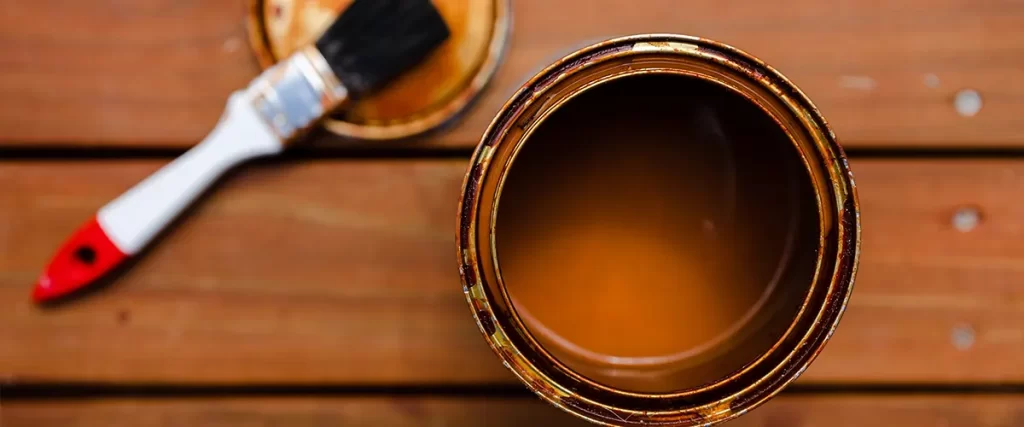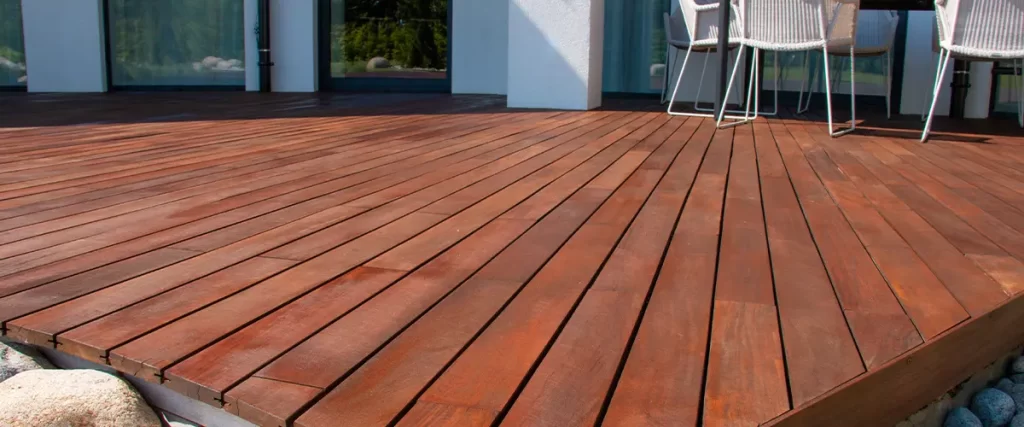When it comes to keeping your deck looking amazing and lasting for years, staining is one of the best things you can do. But here’s the thing: choosing between an oil-based stain and a water-based stain can feel overwhelming. Which one is better? What’s the difference? And how do you even decide?
Don’t worry – we’ve got you covered. Let’s break it all down in the simplest way possible so you can make the best choice for your deck!

The Basics: What Are Oil-Based and Water-Based Stains?
Before we get into the nitty-gritty, let’s start with the basics.
- Oil-Based Stains: These stains are made using—you guessed it—oil! They penetrate deep into the wood, soaking in to protect and nourish it from the inside out. Think of it like lotion for your deck.
- Water-Based Stains: These stains sit more on the surface of the wood and are made with—you guessed it again—water as the main ingredient. They create a protective layer on top of the wood instead of sinking in deeply.
Both stains can protect your deck and make it look beautiful, but they work differently.
Oil-Based Stains: The Pros and Cons
Why People Love Oil-Based Stains
- Deep Penetration
Oil-based stains seep into the wood, providing rich protection from within. This makes them great for older decks or wood that’s been exposed to the elements. - Rich, Natural Look
If you love that warm, classic wood tone, oil-based stains are perfect. They enhance the natural grain of the wood, making your deck look stunning. - Longer Drying Time
Yes, this can be a pro! Since oil-based stains take longer to dry, you have more time to work with them. If you’re a beginner, this can be helpful because it gives you wiggle room to correct mistakes. - Durability
Oil-based stains hold up well in tough weather conditions. They’re great for resisting cracking, peeling, and other wear and tear.
The Downsides of Oil-Based Stains
- Longer Drying Time
Yep, it’s a pro and a con! While it gives you more time to work, it also means your deck will be off-limits longer. - Requires More Maintenance
Oil-based stains tend to attract dirt and mildew over time, so you’ll need to clean your deck more often. - Stronger Smell
The smell of oil-based stains can be intense, so you’ll want to make sure you’re working in a well-ventilated area. - Harder Cleanup
Cleaning up oil-based stains requires special solvents like mineral spirits, which can be a bit of a hassle.

Water-Based Stains: The Pros and Cons
Why People Love Water-Based Stains
- Quick Drying Time
Water-based stains dry fast, so you can get back to enjoying your deck sooner. - Low Odor
If you’re sensitive to smells, water-based stains are much easier on the nose. - Easy Cleanup
Cleanup is a breeze—just use soap and water! No need for fancy chemicals. - Environmentally Friendly
Water-based stains are generally better for the environment since they have lower levels of volatile organic compounds (VOCs). - Resistant to Mildew
Unlike oil-based stains, water-based stains don’t attract mildew, which means less maintenance for you.
The Downsides of Water-Based Stains
- Surface Protection
Since water-based stains don’t soak into the wood as deeply, they might not provide the same level of protection as oil-based stains, especially for older decks. - Shorter Lifespan
Water-based stains might need to be reapplied more often, especially in high-traffic areas. - Can Highlight Flaws
If your wood has imperfections, water-based stains can sometimes make them more noticeable.
Which One Should You Choose?
The decision between oil-based and water-based stains really comes down to your deck, your lifestyle, and what matters most to you. Here are some things to think about:
- Age of Your Deck: If your deck is older, an oil-based stain can help nourish and protect the wood. For newer decks, a water-based stain might be all you need.
- Weather Conditions: Live somewhere with harsh winters or lots of rain? Oil-based stains tend to hold up better in tough weather.
- Maintenance: If you want a low-maintenance option, go for a water-based stain.
- Environment: Care about being eco-friendly? Water-based stains are the greener choice.
- Aesthetics: For that rich, natural wood look, oil-based stains are the way to go.
How to Apply a Deck Stain (No Matter Which One You Choose)
- Clean Your Deck: Make sure your deck is clean and free of dirt, mildew, and old stain before you start. A pressure washer can help with this step.
- Sand If Necessary: If your deck is rough or has peeling stain, give it a light sanding.
- Test the Stain: Always test the stain on a small, inconspicuous area to make sure you like the color.
- Apply Evenly: Use a brush, roller, or sprayer to apply the stain evenly. Work in small sections, and follow the grain of the wood.
- Wipe Off Excess: For oil-based stains, wipe off any excess stain with a cloth to avoid sticky spots.
- Let It Dry: Follow the drying instructions on the stain can. Remember, oil-based stains take longer to dry than water-based ones.
FAQ: Your Questions Answered
Q: Can I switch between oil-based and water-based stains?
A: Yes, but you need to prep your deck carefully. If you’re switching from oil-based to water-based, make sure to remove all the old oil-based stain and clean the deck thoroughly.
Q: Which one is better for high-traffic areas?
A: Oil-based stains tend to hold up better in high-traffic areas because they penetrate deeper into the wood.
Q: Do I need to stain my deck every year?
A: Not necessarily. Oil-based stains can last a few years, while water-based stains may need to be reapplied more often. Check your deck yearly to see if it needs a refresh.
Q: Are oil-based stains being banned?
A: Some places are phasing out oil-based stains due to environmental concerns. Check the regulations in your area before you buy.

Making the Right Choice for Your Deck
Choosing between oil-based and water-based stains might seem tricky, but it all comes down to what works best for you and your deck. If you want that deep, rich look and long-lasting protection, oil-based stains are a great choice. If you’re after quick drying times, easy cleanup, and an eco-friendly option, water-based stains are the way to go.
At the end of the day, both types of stains can protect your deck and make it look fantastic. The key is to weigh the pros and cons and choose the one that fits your needs best.
Werner Decks to help you choose the perfect stain and apply it with expert care. Whether you need advice, a full deck makeover, or professional staining services, we’ve got you covered.
Call us today at (443) 926-6996 to schedule your consultation and give your deck the love it deserves!
